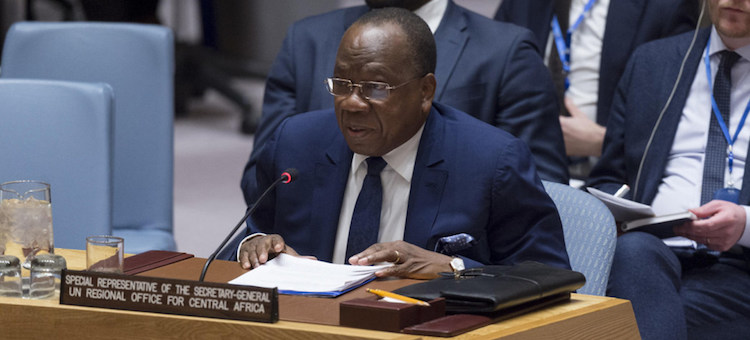By Ramesh Jaura
BERLIN | NEW YORK (IDN) – Underlining interest in cross-border security challenges in Central Africa, as during UN Security Council presidency at the beginning of the year, Kazakhstan has stressed the importance of the United Nations Regional Office for Central Africa (UNOCA), its work in the field of preventive diplomacy and mediation, as well as the support it provides to regional and sub-regional organizations in achieving durable and long-term peace.
Kazakhstan is the first Central Asian country to have been elected to the Security Council as a non-permanent member for the two-year period 2017-2018. Beginning of 2018, Indonesia will step in its toes on behalf of the Asia-Pacific region.
Briefing the 15-member Security Council on June 13, François Louncény Fall, Special Representative of the UN Secretary-General for Central Africa and UNOCA Head said the international community must have a coordinated response to the serious political and security challenges in Central Africa, which include armed conflict, terrorism, poaching, organized transnational crime and maritime piracy.
The situation in Central Africa continues to be tenuous, particularly in countries affected by long-standing conflicts, such as the Central African Republic and the Democratic Republic of the Congo, he added, pointing out that all 11 member States of the Economic Community of Central African States (ECCAS) were in the middle or beginning of electoral cycles, while populations across the region continued to call for better socioeconomic conditions.
“The scourge of terrorism and violent extremism continues to affect populations of the subregion and divert Government resources from much-needed development programmes to costly security operations,” he warned, adding that Boko Haram and the Lord’s Resistance Army (LRA) had not stopped their deadly attacks on civilians, committing egregious human rights abuses, resulting in countless victims.
“Violent extremism, as well as persisting cross-border security and criminal activities, are compounded by the flow of small arms and light weapons throughout the subregion,” he emphasized. To respond to those challenges, he noted that the first Conference of States Parties to the Central African Convention for the Control of Small Arms and Light Weapons, their Ammunition and all Parts and Components was taking place in Cameroon, with the participation of UNOCA.
Ahmad Allam-Mi, ECCAS Secretary-General, speaking via video-teleconference noted ECCAS efforts in the areas of maritime security and the fight against terrorism. A framework for cooperation with the Economic Community of West African States (ECOWAS) on the latter issue was being prepared ahead of a joint summit of the two organizations in late July, he said.
Echoing concerns about the continued presence of Boko Haram and LRA in the region, Council members stressed the need for bolstered international support to combat the terrorist activities of those groups.
Ambassador Kairat Umarov, Kazakstan’s Permanent Representative to the United Nations in New York, thanked UNOCA chief for the informative briefing. While expressing concern about the tension in the English-speaking regions of Cameroon, he ensured Kazakhstan’s support for the efforts of the Cameroon authorities, as well as UNOCA, AU (African Union) and ECCAS, to address this issue. “At the same time, we urge all parties involved creating all necessary conditions for the cessation of violence, and we stress the need to establish a genuine and inclusive dialogue,” Ambassador Umrov added.
He went on to say: “Like others, we draw attention to the activities of ‘Boko Haram’ and other extremist groups and networks of organized crime. It is important that the AU, the Lake Chad Basin Commission and the UN continue to work towards formulating and implementing a well-coordinated regional strategy to fight the root causes of the crisis, which are transnational and know no borders.”
Simultaneously, to be effective and streamlined, he noted, the UN has to ‘Deliver as One’ with a strengthened security-development nexus for more enduring political and socio-economic stability.
The regional states encounter unprecedented challenges in combating terrorism, said the Kazakh Permanent Representative, adding: “We support the efforts of UNOCA to coordinate the activities of regional organizations in the fight against terrorism. We welcome the adoption of the ECCAS strategy for preventing and combating terrorism in Central Africa, developed under the UN Standing Advisory Committee on Security Questions in Central Africa (UNSAC).”
Kazakhstan is calling on all international partners to continue to support regional counter-terrorist forces, such as the Multinational Joint Task Force in the Lake Chad area and the AU Regional Task Force in the Central African region.
“Despite the existing problems in the region,” Ambassador Umarov said, “we note the efforts and commitment of countries to increase subregional integration and ongoing reforms aimed at strengthening democratic governance.”
The problem of the increasing number of internally displaced persons and refugees in the region deserves special attention, he said. This issue puts a heavy burden on host communities and countries against the backdrop of limited funding for humanitarian assistance, a reduction in humanitarian access due to the lack of security for those in need of help.
Outbreaks of epidemics worsen the situation. In this regard, not only the support of international donors is needed, but also the coordinated efforts of local governments to ensure security and create conditions for the voluntary return of refugees, with the full support of the UN system.
The Kazakh Permanent Representative to the UN concluded: “We highly appreciate the coordinating role of UNOCA as the secretariat of the UN Standing Advisory Committee on Security Issues in Central Africa and its invaluable contribution to the maintenance of peace and security in the region. Still, much work remains to be done to consolidate the gains achieved. In this regard, we support the extension of the UNOCA mandate for the next three years.” [IDN-InDepthNews – 17 June 2018]
Photo: François Loucény Fall, Special Representative of the Secretary-General and Head of the UN Regional Office for Central Africa (UNOCA), briefs the Security Council on the situation in the Central African region. UN Photo/Rick Bajornas
IDN is flagship agency of the International Press Syndicate.
facebook.com/IDN.GoingDeeper – twitter.com/InDepthNews

